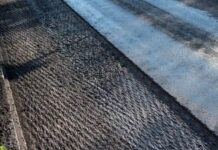Cost-Effective Solutions, Finding the Right Asphalt Driveway Sealer
Maintaining an asphalt driveway involves proactive care, including regular sealing to protect against weather elements, wear, and tear. Choosing the right asphalt driveway sealer is crucial for enhancing durability and extending the lifespan of your pavement. At Commonwealth Paving, we specialize in providing expert advice and services for asphalt driveway sealing, ensuring cost-effective solutions that prioritize quality and longevity. For inquiries or to schedule asphalt driveway sealing, contact us at +1 502 459 7283 or visit us at 136 Outerloop, Louisville, Kentucky 40214.
Importance of Asphalt Driveway Sealing
Asphalt driveways are susceptible to damage from various factors, including UV rays, moisture, oil spills, and traffic load. Sealing the driveway forms a protective barrier that enhances resistance to these elements, preventing premature deterioration and reducing maintenance costs over time. The key benefits of asphalt driveway sealing include:
- Waterproofing: Sealers prevent water penetration into the asphalt surface, minimizing the risk of cracks, potholes, and frost damage.
- UV Protection: UV-resistant sealers shield the asphalt from sun exposure, preventing oxidation and color fading.
- Enhanced Durability: Sealing enhances the overall strength and resilience of the asphalt, prolonging its lifespan.
- Aesthetic Improvement: Sealers enhance the appearance of the driveway by restoring color and providing a smooth finish.
- Ease of Maintenance: Sealed driveways are easier to clean and maintain, requiring less frequent repairs and treatments.
Types of Asphalt Driveway Sealers
When selecting an asphalt driveway sealer, it’s essential to consider the specific needs of your pavement and the environmental conditions in your region. Common types of asphalt driveway sealers include:
- Coal Tar Sealers
- Composition: Coal tar sealers are derived from coal tar pitch and offer excellent durability and waterproofing properties.
- Benefits: Known for their resistance to oil, gasoline, and UV rays, making them ideal for high-traffic areas.
- Considerations: May emit strong odors and require adequate ventilation during application.
- Asphalt Emulsion Sealers
- Composition: Asphalt emulsion sealers are water-based and contain asphalt particles suspended in water.
- Benefits: Environmentally friendly, easy to apply, and provide good UV resistance and flexibility.
- Considerations: Require thorough mixing before application and may require more frequent reapplication compared to coal tar sealers.
- Acrylic Sealers
- Composition: Acrylic sealers are made from acrylic polymers and offer excellent UV resistance and color enhancement.
- Benefits: Provide a glossy finish, enhance pavement aesthetics, and are easy to apply.
- Considerations: Less durable than coal tar sealers in high-traffic areas and may require more frequent resealing.
- Polymer-Modified Sealers
- Composition: Polymer-modified sealers incorporate polymers for added flexibility, durability, and resistance to cracking.
- Benefits: Ideal for regions with extreme weather conditions and heavy traffic, offering superior performance and longevity.
- Considerations: Higher initial cost compared to traditional sealers but provide long-term cost savings through reduced maintenance.
Factors to Consider When Choosing an Asphalt Driveway Sealer
- Sealer Performance: Assess the sealer’s performance in terms of waterproofing, UV resistance, flexibility, and durability.
- Application Method: Consider whether the sealer can be applied using spray, brush, or squeegee methods, depending on driveway size and complexity.
- Environmental Impact: Choose environmentally friendly sealers that minimize volatile organic compound (VOC) emissions and adhere to local regulations.
- Cost-Effectiveness: Evaluate the initial cost of the sealer versus its expected lifespan and maintenance requirements to determine long-term value.
- Manufacturer’s Reputation: Select sealers from reputable manufacturers known for quality products and customer support.
DIY vs. Professional Asphalt Driveway Sealing
- DIY Sealing: Suitable for homeowners familiar with asphalt maintenance, offering cost savings but requiring proper equipment and application knowledge.
- Professional Sealing: Recommended for complex driveways, providing expertise, efficiency, and access to high-quality materials for superior results and durability.
Choosing the right asphalt driveway sealer is essential for protecting your investment and ensuring long-lasting pavement performance. Whether you opt for coal tar, asphalt emulsion, acrylic, or polymer-modified sealers, Commonwealth Paving offers expert guidance and professional services to meet your asphalt sealing needs. Contact us today at +1 502 459 7283 or visit us at 136 Outerloop, Louisville, Kentucky 40214, to learn more about our comprehensive paving solutions and how we can help enhance the durability and aesthetics of your asphalt driveway. Our commitment to excellence ensures cost-effective solutions that prioritize quality and customer satisfaction.
Expert Tips for Long-Lasting Results with Asphalt Driveway Sealer
Maintaining an asphalt driveway involves more than occasional repairs; it requires proactive sealing to protect against weather elements, traffic wear, and deterioration. Choosing and applying the right asphalt driveway sealer correctly can significantly extend the lifespan of your pavement while enhancing its appearance. At Commonwealth Paving, we specialize in providing expert guidance and professional services for asphalt driveway sealing, ensuring long-lasting results that prioritize durability and aesthetics. For inquiries or to schedule asphalt driveway sealing, contact us at +1 502 459 7283 or visit us at 136 Outerloop, Louisville, Kentucky 40214.
Importance of Asphalt Driveway Sealing
Asphalt driveways are durable surfaces, but they require regular maintenance to withstand the rigors of everyday use and exposure to the elements. Sealing the driveway provides essential protection by:
- Preventing Water Damage: Sealers act as a barrier against water penetration, reducing the risk of cracks, potholes, and pavement degradation caused by moisture infiltration.
- UV Protection: UV-resistant sealers shield the asphalt from sun exposure, preventing oxidation and preserving the driveway’s color and integrity.
- Enhancing Aesthetics: Sealers restore the driveway’s original color and provide a smooth, uniform appearance, enhancing curb appeal and property value.
- Improving Longevity: Properly sealed driveways are more resistant to wear and tear, requiring less frequent repairs and maintenance.
Expert Tips for Effective Asphalt Driveway Sealing
- Choose the Right Sealer:
- Consider the Type: Evaluate asphalt emulsion, coal tar, acrylic, or polymer-modified sealers based on their performance characteristics and suitability for your driveway’s needs.
- Read Manufacturer Recommendations: Follow the manufacturer’s guidelines regarding application methods, coverage rates, and specific conditions for optimal results.
- Prepare the Surface:
- Clean Thoroughly: Remove dirt, debris, oil stains, and vegetation from the driveway surface using a pressure washer or cleaning solution.
- Repair Cracks: Fill cracks and potholes with suitable asphalt patching material and allow sufficient curing time before applying the sealer.
- Apply Sealant Properly:
- Temperature and Weather: Choose a dry, mild day with temperatures above 50°F (10°C) for optimal sealer application.
- Use the Right Tools: Apply the sealer evenly using a brush, squeegee, or sprayer to ensure uniform coverage and avoid puddling.
- Work in Sections: Divide the driveway into manageable sections and work systematically to maintain a consistent application rate.
- Allow Adequate Drying Time:
- Follow Instructions: Allow the sealer to dry according to the manufacturer’s recommendations before allowing foot or vehicle traffic on the driveway.
- Protect Freshly Sealed Areas: Place barricades or caution tape around the driveway to prevent accidental damage while the sealer cures.
- Schedule Regular Maintenance:
- Monitor Wear and Tear: Periodically inspect the driveway for signs of wear, cracking, or fading, and schedule resealing as needed to maintain protection and appearance.
- Address Issues Promptly: Promptly repair any new cracks or damage to prevent extensive repairs and prolong the driveway’s lifespan.
Benefits of Professional Asphalt Driveway Sealing
While DIY sealing can be cost-effective for homeowners, professional asphalt driveway sealing offers several advantages:
- Expertise and Experience: Professional contractors, like Commonwealth Paving, have the knowledge and equipment to ensure precise application and long-lasting results.
- High-Quality Materials: Access to commercial-grade sealers and equipment enhances the durability and effectiveness of the sealing process.
- Time Efficiency: Professionals complete the job efficiently, minimizing disruption and ensuring optimal results with minimal downtime.

Achieving long-lasting results with asphalt driveway sealer requires careful planning, proper preparation, and meticulous application. Whether you choose to undertake the task yourself or hire professionals, prioritizing quality materials and techniques is key to maximizing the benefits of sealing. At Commonwealth Paving, we are dedicated to providing expert guidance and professional services tailored to meet your asphalt driveway sealing needs. Contact us today at +1 502 459 7283 or visit us at 136 Outerloop, Louisville, Kentucky 40214, to discover how our commitment to excellence can enhance the durability and aesthetics of your asphalt driveway.
The Environmental Impact of Asphalt Driveway Sealers
Asphalt driveway sealers play a crucial role in protecting and enhancing the longevity of asphalt pavements. However, understanding their environmental impact is essential for making informed decisions about driveway maintenance practices. At Commonwealth Paving, we prioritize environmentally responsible solutions and offer expert guidance on asphalt driveway sealers. For inquiries or to schedule asphalt driveway sealing services, contact us at +1 502 459 7283 or visit us at 136 Outerloop, Louisville, Kentucky 40214.
Types of Asphalt Driveway Sealers
Before delving into their environmental impact, it’s essential to understand the types of asphalt driveway sealers commonly used:
- Coal Tar Sealers:
- Composition: Derived from coal tar, these sealers are known for their durability and resistance to chemicals and UV rays.
- Environmental Concerns: Coal tar sealers contain polycyclic aromatic hydrocarbons (PAHs), which are toxic and can pose risks to aquatic life and human health if not handled and disposed of properly.
- Asphalt Emulsion Sealers:
- Composition: Water-based sealers containing asphalt particles suspended in water.
- Environmental Benefits: Generally considered more environmentally friendly than coal tar sealers due to lower VOC emissions and reduced toxicity.
- Application: Easier cleanup and less impact on surrounding vegetation and water bodies.
- Acrylic Sealers:
- Composition: Made from acrylic polymers, these sealers offer excellent UV resistance and aesthetic enhancement.
- Environmental Impact: Generally considered safe, with low VOC emissions, making them suitable for residential applications.
- Polymer-Modified Sealers:
- Composition: Incorporate polymers for added flexibility and durability.
- Environmental Benefits: Provide enhanced performance and longevity, reducing the frequency of resealing and overall environmental impact.
Environmental Considerations of Asphalt Driveway Sealers
While asphalt driveway sealers offer benefits in terms of pavement protection and aesthetics, they can also have environmental implications:
- Emissions During Application:
- Volatile Organic Compounds (VOCs): Some sealers release VOCs during application, contributing to air pollution and potential health risks.
- Regulatory Compliance: Regulations may restrict the use of high-VOC sealers in certain regions to mitigate environmental impact.
- Water Contamination:
- Runoff Concerns: Improperly applied or disposed sealers can wash off during rainfall and contaminate water bodies with harmful chemicals.
- Aquatic Life: PAHs from coal tar sealers pose risks to aquatic ecosystems, affecting fish and other aquatic organisms.
- Long-Term Effects:
- Environmental Persistence: PAHs and other contaminants from sealers can persist in soil and water bodies, impacting ecosystems over time.
- Cumulative Impact: Continuous application and reapplication of sealers can exacerbate environmental degradation if not managed responsibly.
Best Practices for Minimizing Environmental Impact
To minimize the environmental impact of asphalt driveway sealers, consider the following best practices:
- Choose Low-VOC Sealers: Opt for sealers with low VOC content to reduce air pollution and comply with local regulations.
- Proper Application: Follow manufacturer guidelines for application rates, techniques, and weather conditions to minimize waste and runoff.
- Dispose of Waste Responsibly: Dispose of leftover sealers, containers, and cleaning materials according to local environmental regulations.
- Consider Alternative Materials: Explore environmentally friendly alternatives such as asphalt emulsion sealers or acrylic sealers that offer comparable performance with lower environmental impact.
- Regular Maintenance: Implement a regular maintenance schedule to extend the lifespan of your driveway, reducing the need for frequent sealing and minimizing overall environmental impact.
Commonwealth Paving’s Commitment to Environmental Responsibility
At Commonwealth Paving, we are committed to environmental stewardship and offer asphalt driveway sealing services that prioritize sustainability and compliance with environmental regulations. Our team utilizes industry-best practices and environmentally friendly materials to ensure minimal impact on the environment while delivering superior pavement protection and aesthetics.

Understanding the environmental impact of asphalt driveway sealers is crucial for making informed decisions that balance pavement maintenance needs with environmental sustainability. By choosing low-VOC sealers, practicing responsible application and disposal methods, and considering alternative materials, homeowners can minimize their environmental footprint while preserving the integrity and longevity of their asphalt driveways.
For expert guidance on asphalt driveway sealing and environmentally responsible pavement solutions, contact Commonwealth Paving at +1 502 459 7283 or visit us at 136 Outerloop, Louisville, Kentucky 40214. Discover how our commitment to excellence and environmental responsibility can benefit your property and community.
Comparing Water-Based vs. Oil-Based Asphalt Driveway Sealers
Choosing the right asphalt driveway sealer is crucial for protecting your pavement from weather elements, enhancing its appearance, and extending its lifespan. One of the primary decisions homeowners face is whether to use water-based or oil-based sealers. Understanding the differences between these two types can help you make an informed decision that best suits your driveway’s needs. At Commonwealth Paving, we specialize in asphalt driveway sealing and offer expert guidance on selecting the right sealer for your specific requirements. Contact us at +1 502 459 7283 or visit us at 136 Outerloop, Louisville, Kentucky 40214, for professional advice and services tailored to your pavement maintenance needs.
Water-Based Asphalt Driveway Sealers
Water-based sealers are formulated with water as the primary solvent, containing asphalt emulsions or acrylic polymers. They are popular among homeowners and contractors for several reasons:
- Environmental Benefits: Water-based sealers typically have lower VOC emissions compared to oil-based sealers, making them more environmentally friendly and compliant with strict air quality regulations.
- Ease of Application: They are easier to apply and clean up, requiring less solvent for equipment and tools.
- Quick Drying: Water-based sealers generally dry faster than oil-based counterparts, allowing for quicker turnaround times and reducing downtime for homeowners.
- Flexibility: They offer good flexibility and are less prone to cracking, which can be beneficial in regions with fluctuating temperatures.
However, there are some considerations to keep in mind when using water-based asphalt driveway sealers:
- Durability: They may not be as durable as oil-based sealers, especially in high-traffic areas or harsh weather conditions.
- Maintenance: Water-based sealers may require more frequent reapplication compared to oil-based sealers to maintain optimal protection and appearance.
Oil-Based Asphalt Driveway Sealers
Oil-based sealers, also known as coal tar sealers, are derived from coal tar or asphalt. They have been traditionally used for driveway sealing and offer unique advantages:
- Durability: Oil-based sealers provide superior durability and resistance to harsh weather conditions, including UV rays, chemicals, and oil spills.
- Longevity: They typically require less frequent reapplication compared to water-based sealers, providing longer-lasting protection.
- Enhanced Appearance: Oil-based sealers often enhance the color and texture of the asphalt, giving it a richer, darker appearance.
However, there are environmental and practical considerations associated with oil-based asphalt driveway sealers:
- Environmental Impact: Oil-based sealers may contain higher VOC levels than water-based sealers, contributing to air pollution and environmental concerns.
- Application Challenges: They can be more challenging to apply and require proper ventilation due to their higher solvent content.
- Cleanup: Cleaning equipment and tools used with oil-based sealers can be more cumbersome and may require specific solvents.
Choosing the Right Asphalt Driveway Sealer
When deciding between water-based and oil-based asphalt driveway sealers, consider the following factors:
- Environmental Concerns: If reducing VOC emissions and environmental impact is a priority, water-based sealers may be the preferred choice.
- Durability Needs: For driveways exposed to heavy traffic or extreme weather conditions, oil-based sealers may offer superior protection and longevity.
- Application Ease: Water-based sealers are generally easier to apply and clean up, making them suitable for DIY projects or homeowners looking for convenience.
- Aesthetic Preferences: Consider the desired appearance of your driveway, as oil-based sealers often provide a darker, glossier finish compared to water-based sealers.
Professional Guidance and Services
At Commonwealth Paving, we offer professional asphalt driveway sealing services tailored to meet your specific needs and preferences. Our team of experts can assess your driveway’s condition, recommend the most suitable sealer type, and ensure proper application for long-lasting protection and aesthetic appeal. Contact us today at +1 502 459 7283 or visit us at 136 Outerloop, Louisville, Kentucky 40214, to learn more about our comprehensive paving solutions and how we can enhance the durability and appearance of your asphalt driveway. Trust Commonwealth Paving for quality service and expertise in asphalt driveway sealing.
Address
Commonwealth Paving, 136 Outerloop, Louisville, Kentucky 40214
Phone: 502-459-7283, Fax: 502-456-2678
Opening Hours
| Monday | 9:00 AM – 5:00 PM |
| Tuesday | 9:00 AM – 5:00 PM |
| Wednesday | 9:00 AM – 5:00 PM |
| Thursday | 9:00 AM – 5:00 PM |
| Friday | 9:00 AM – 5:00 PM |
| Saturday | Closed |
| Sunday | Closed |







